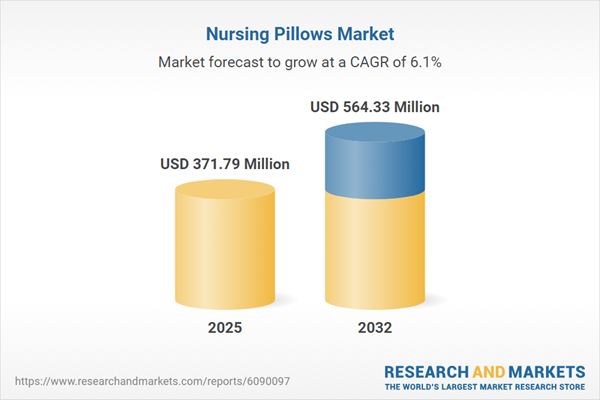Speak directly to the analyst to clarify any post sales queries you may have.
The nursing pillows market is witnessing robust evolution, driven by technological advancement, growing demand for multifunctional baby products, and shifting regulatory conditions. Senior leaders need a concise understanding of current market movements and strategic opportunities as competitive pressures heighten.
Market Snapshot: Nursing Pillows Market Growth Overview
The Nursing Pillows Market grew from USD 351.31 million in 2024 to USD 371.79 million in 2025. It is expected to continue growing at a CAGR of 6.10%, reaching USD 564.33 million by 2032.
Scope & Segmentation
This report provides in-depth analysis and forecasts, addressing the following market segments, coverage areas, and emergent technologies:
- Product Types: C-Shaped Nursing Pillows, Inflatable Nursing Pillows, U-Shaped Nursing Pillows, Wedge Nursing Pillows
- Age of Baby: Infants, Newborns, Older Infants
- Core Materials: Foam, Memory Foam, Polyester Fiberfill
- Cover Materials: Bamboo Fabric, Cotton, Organic Fabric, Polyester
- Usage Patterns: Home Use, Hospital Use, Travel Use
- Applications: Bottle Feeding Support, Breastfeeding Support, Postpartum Relaxation
- Purchasing Channels: Baby Specialty Stores, Supermarkets & Hypermarkets, Brand-owned Websites, eCommerce Platforms
- Geographies: Americas, Europe, Middle East & Africa, Asia-Pacific, including focused country-level insights
- Leading Companies: Artsana S.p.A., BABY & MOM RETAIL PVT. LTD, bbhugme AS, Blessed Nest, Inc., Breastfeeding Bliss Ltd, Cocoon Company Limited, CozyCradle Inc, CuddleCare Medical, Firstin Infant Nursing, GoDaddy, LLC., Inter IKEA Systems B.V., Mamas & Papas Ltd., Mammacare Foundation Inc, Moonboon International ApS, Mothership Wellness Corp, My Brest Friend, LLC, Nest & Nurture Inc, NurtureNest Ltd, Purflo Ltd., Tender Moments LLC, The Boppy Company, LLC, Twin Z, LLC, Warmth & Wellness LLC
Key Takeaways for Senior Decision-Makers
- Heightened ergonomic design innovation is shaping differentiated product offerings and responding directly to caregiver and infant needs.
- Growing consumer preference for sustainability is prompting manufacturers to introduce organic materials and eco-friendly packaging for nursing pillows.
- Emerging integration of smart textiles and basic IoT capabilities is moving the sector toward more data-driven maternal care.
- Versatility in product design supports both feeding routines and developmental needs, addressing use cases like tummy time and postpartum recovery.
- Regional markets demand tailored solutions: Premiumization in North America, sustainability emphasis in Europe, value-driven preferences in the Middle East & Africa, and rapid adoption in Asia-Pacific.
- Leading players are leveraging direct-to-consumer strategies, strengthening clinical collaborations, and expanding through targeted mergers and acquisitions.
Tariff Impact
Recent United States tariffs have directly influenced manufacturing sourcing, input costs, and end-user pricing strategies. Companies are revising supply chains by pursuing more domestic or nearshore production and adopting alternate materials to manage elevated input expenses. These changes have resulted in strategic adjustments to distribution models and consumer pricing structures, driving the need for agile cost management and transparent stakeholder communication.
Research Methodology & Data Sources
This research combines structured interviews with healthcare professionals, product designers, and industry executives, reinforced by detailed analysis of industry reports, trade publications, and regulatory data. Multi-source validation and data triangulation ensure the reliability and accuracy of insights delivered.
Why This Report Matters
- Equips executives and managers with actionable intelligence on emerging design, technology, and sustainability trends in the nursing pillows market.
- Supports supply chain, procurement, and product leaders in navigating tariff impacts and evolving sourcing strategies.
- Delivers clear segmentation and regional context, enabling tailored go-to-market and competitive strategies for multi-national decision-making.
Conclusion
The nursing pillows market is poised for continued evolution, shaped by product innovation, regulatory shifts, and stronger sustainability imperatives. Decision-makers informed by up-to-date insights will be best positioned to leverage growth opportunities and mitigate emerging risks.
Table of Contents
3. Executive Summary
4. Market Overview
7. Cumulative Impact of Artificial Intelligence 2025
Companies Mentioned
The companies profiled in this Nursing Pillows market report include:- Artsana S.p.A.
- BABY & MOM RETAIL PVT. LTD
- bbhugme AS
- Blessed Nest, Inc.
- Breastfeeding Bliss Ltd
- Cocoon Company Limited
- CozyCradle Inc
- CuddleCare Medical
- Firstin Infant Nursing
- GoDaddy, LLC.
- Inter IKEA Systems B.V.
- Mamas & Papas Ltd.
- Mammacare Foundation Inc
- Moonboon International ApS
- Mothership Wellness Corp
- My Brest Friend, LLC
- Nest & Nurture Inc
- NurtureNest Ltd
- Purflo Ltd.
- Tender Moments LLC
- The Boppy Company, LLC
- Twin Z, LLC
- Warmth & Wellness LLC
Table Information
| Report Attribute | Details |
|---|---|
| No. of Pages | 186 |
| Published | November 2025 |
| Forecast Period | 2025 - 2032 |
| Estimated Market Value ( USD | $ 371.79 Million |
| Forecasted Market Value ( USD | $ 564.33 Million |
| Compound Annual Growth Rate | 6.1% |
| Regions Covered | Global |
| No. of Companies Mentioned | 24 |









